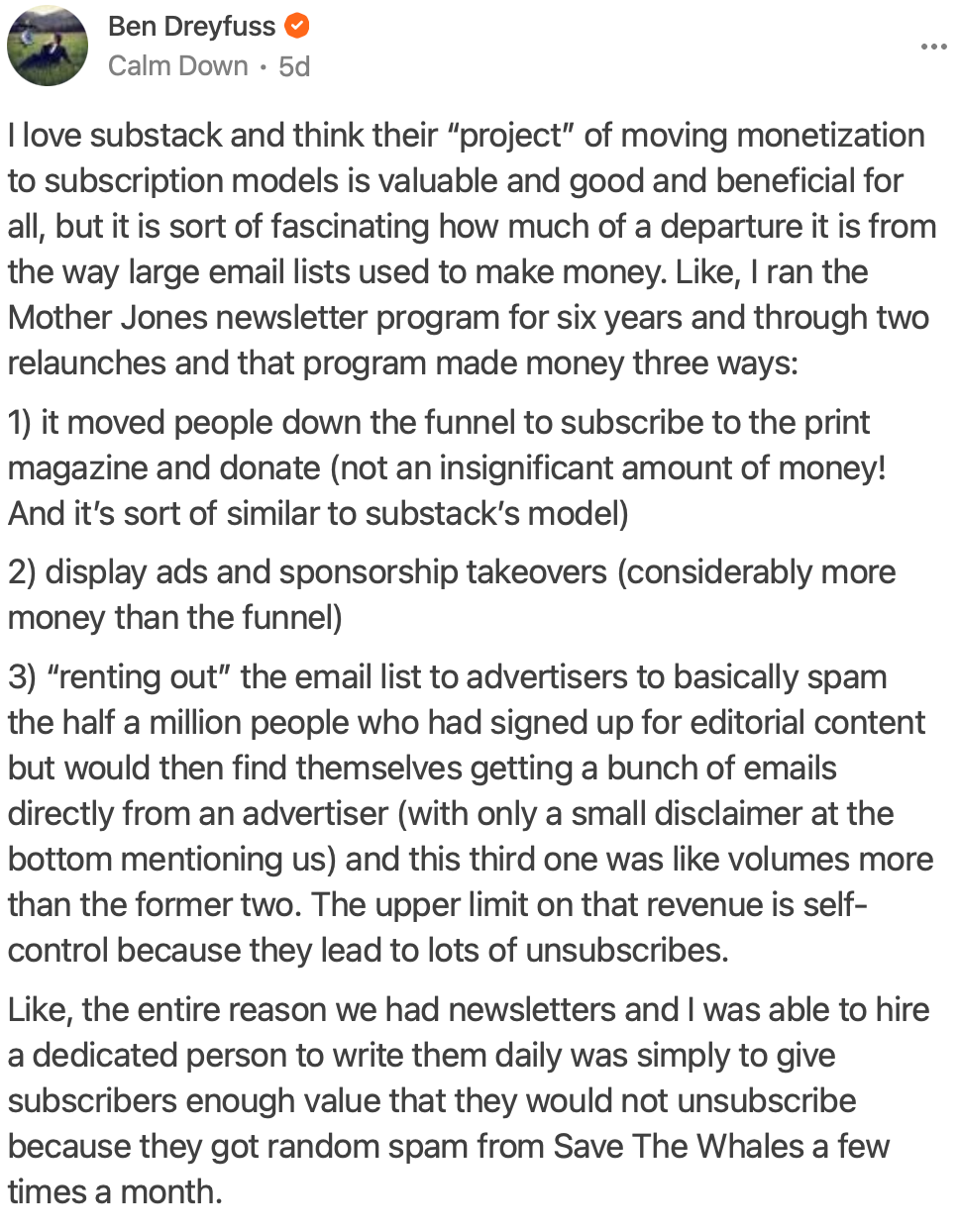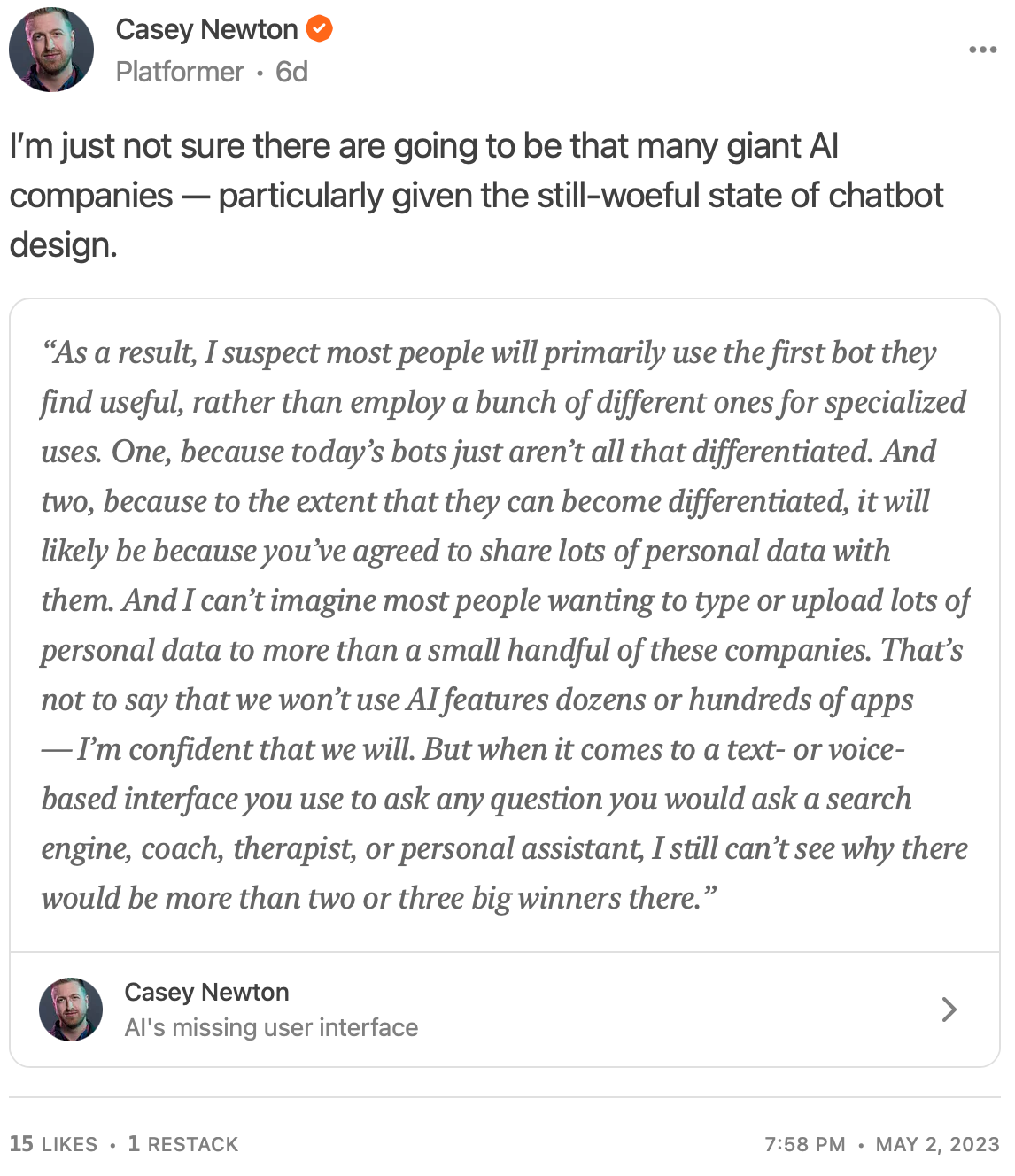The Discourse Report: May 8, 2023
Welcome to DiscRep, Berny Belvedere’s daily guide to the public discourse for Arc members. Got something you think I should include in a future entry? Write me at berny@arcdigital.media. To discuss any of today’s items, post a comment below.
Articles
How to Build (and Destroy) a Social Network by Charlie Warzel in The Atlantic
Twitter Blue may be boneheaded as a revenue scheme, but it excels as a case study in how grappling for status can ruin a social network—especially as a point of contrast to a new social network that the most online among us are flocking to. I’ve spent the past week clicking between two tabs: In one is Twitter, which is visibility suffocating under the weight of Musk’s enormous ego and a series of awful managerial decisions; in the other is Bluesky, a decentralized, invite-only clone of Twitter, which has exploded in popularity in just a few days, attracting celebrities, politicians, and a legion of beloved, extremely online shitposters. Status across social networks is always in flux, but the past few weeks have felt like a controlled experiment in how social capital is won and lost and how online communities respond to upheaval.
As a Post-American Middle East Dawns, Iran and China Rush to Fill the Void by Max Boot in The Washington Post
The geopolitical shift in the region doesn’t necessarily spell disaster for the United States. Miller argues that we have only three essential interests in the Middle East — fighting terrorism, guaranteeing global access to oil and preventing nuclear proliferation — and that we are still doing fine with the first two. It’s on the third priority that we have a major problem. If Iran goes nuclear, the Saudis, Emiratis and Turks might not be far behind. …
The administration needs to do some hard thinking about how to safeguard vital U.S. interests amid the shifting sands of the Middle East. Pretending that the power shift isn’t happening — and that the United States can continue to act like a hegemon — isn’t going to work. The administration needs to get out of denial and start coping with the new reality. For the first time in decades, the United States has to compete for influence in the Middle East rather than taking its primacy for granted. Washington might even have to get used to a growing role for China. That might make a lot of Americans uncomfortable, but that’s the price of extracting the United States from so much involvement in the Middle East. With less commitment comes less influence.
In Defense of Nostalgia by Ross Douthat in The New York Times
The Columbia University professor Mark Lilla, a perspicacious liberal critic of the contemporary right and left, has an essay in the latest issue of Liberties Journal analyzing the appeal and perils of nostalgia. The appeal is universal, he argues: Like late-middle-aged adults flipping through vacation pictures that “remind us, or delude us into thinking, that family relations were once simpler and happier than they are now,” almost every society finds itself mythologizing and romanticizing its own origin or past. But the peril is inherent in the romance: No less than the utopian futurist, the backward-looking romantic is tempted to violently wrench the present out of joint, to sacrifice lives and treasure on the altar of a “lost wholeness,” a fantasy of never-was.
Lilla illustrates this peril with a long discussion of the role that nostalgia and imagined pasts played in the rise and shape and savagery of National Socialism in Germany. The Hitlerian politics of nostalgia wasn’t confined to fantasies of Teutonic purity, he notes; the Nazis laid claim to the heritage of Greece as well, with Hitler himself “drawing a parallel between the Spartan practice of abandoning handicapped children in the wild” and his regime’s “industrialized-scale eugenic cleansing.” And that kind of invocation, the conscious linkage of the ancient world to the modern present, was itself an imitation of the spirit of Augustan-age Rome, whose cultural project, embodied most of all by Virgil, was to “redirect nostalgia for the past toward the future and raise the prospect of leapfrogging over the present to arrive at a utopian world to come.”
Who Killed the Category Killer? by Addison Del Mastro in The Bulwark
Anecdotally, while I’ve always liked Bed Bath & Beyond, I haven’t found it to be an expertly run store. My wife and I bought a ceramic utensil holder from its website; it arrived in pieces, with no packing material to protect it inside its oversized box. (That, of course, is no way to beat Amazon.) Another time, we learned that while Bed Bath & Beyond coupons could be used at other subsidiaries (buybuy BABY, and, at that time, World Market), Bed Bath & Beyond gift cards could only be used at Bed Bath & Beyond and buybuy BABY, not World Market. (If I’m remembering this wrong, well, that’s the point.)
But the bigger picture is more interesting than the economic analysis or the culture-war haymaking. Bed Bath & Beyond was a quintessential “category killer”: a marriage of the big-box superstore (discount) and the specialty store (wide selection and knowledge), which emerged in its present form in the 1980s and 1990s. This particular retail segment has been perhaps hardest hit by the “retail apocalypse”: Borders, Toys ‘R’ Us, Sports Authority, and Circuit City come to mind, among others. Best Buy has weathered rough patches; Office Depot has been slowly shrinking but is holding on. You can probably think of others.
Notes
Tweets
Clips
United Airlines Explains How it Orchestrates 30,000 Weekly Flights (The Wall Street Journal)











I think Addison Del Mastro gets sick pleasure in always making us think about shopping. He's the Outparcel Whisperer. ;)